Latest News
Preparing Students to Succeed
Posted by on September 26, 2014 at 11:12 AM EST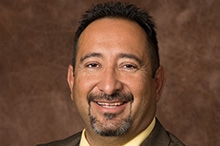
Pat Sánchez is being honored as a Latino Educator Champion of Change.
Nestled in the historic community of Commerce City and bisected by busy roadways and industry, Adams County School District 14 (Adams 14) is Colorado’s 26th largest school district, serving more than 7,500 students annually. In Adams 14, nearly 83% of students qualify for free and reduced lunch, nearly 87% of students are children of color, and nearly 60% of students are English Language Learners.
In advance of the 2012-13 school year, the Adams 14 Board of Education initiated the complete reconstruction of District administration in order to accelerate reform and improvement in this historically low-performing district. The Board selected me, a lifelong educator, as the new superintendent, based on my past performance in transforming inner city schools.
Because people support what they help create, my first order of business was to engage in regular communications with all District stakeholders – students, families, employees, and community members – in order to foster a climate and culture of mutual trust and respect.
This approach helps me address the disparities in Adams 14 that are preventing equity amongst our students. I believe that important discussions with our community partners will help us understand some of the challenges that our students are facing. That’s why I transformed Adams 14’s District Advisory Accountability Committee meetings from a dumping ground for negativity to a community platform where ideas, opportunities, and discussions about children are celebrated.
In Adams 14, I have tried to ensure that all students are provided culturally-responsive learning environments and are engaged through powerful instructional strategies that facilitate English-language acquisition. Now, our schools have a culture that is based on high expectations for all students and employees, combined with one that supports both academic and social growth for all students.
Today, there are undeniable, national academic disparities between students of different races and ethnicities. Adams 14 is boldly addressing these disparities that are preventing racial educational equity. I am committed to ensuring that race is no longer a predictor of academic success.
I initiated a Latino Parent Committee to engage a large proportion of Adams 14’s parent population that had been historically undeserved. I have worked tirelessly to empower all families and community members to become engaged partners in their child’s education by creating welcoming environments District-wide that reflect and support a culturally diverse population.
A substantial piece of my overall leadership message is the critical importance of creating a paradigm shift in the way we think about our children – and how it is essential to view our children as assets. With this attitude, I’m confident that we will continue educating children of all backgrounds, preparing them to succeed regardless of where they come from.
Pat Sánchez is Superintendent of Adams County School District 14 in Colorado.
Learn more about EducationA Destiny to Serve and Be a Champion of Change
Posted by on September 26, 2014 at 11:08 AM EST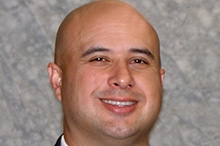
Dr. Gonzalo La Cava is being honored as a Latino Educator Champion of Change.
Not long ago, my seven-year-old daughter asked me a seemingly easy question: “Daddy, does your job make you happy?” While simple in nature, her innocent words made me reflect on my career path. The answers came flooding in and were superficial at first. But as I sat still and pondered her question, I came to some realizations about my profession.
Although I firmly believe that all children can learn and deserve a high-quality education, serving those who are underrepresented is my mission as an educator. Circumstances such as poverty, inadequate cultural support, or a lack of familial education can create an unequal playing field for these students and limit their exposure to opportunity. By no fault of their own, these children are underrepresented in leadership roles in our country. On many occasions, our education system seems to underestimate what they can accomplish.
While some people think that children from traditionally disadvantaged groups are a “lost cause,” I know that each child has the potential for success. In Orange County Public Schools in Florida, I led two majority/minority Title 1 schools to ‘A’ ratings and increased the scores of students in reading, math and writing. I have been able to turn around challenging schools by changing the culture of the staff, reducing suspensions, focusing on literacy, and engaging the local community. Our success did not come overnight; it took our dedicated staff years to reach our objectives. Some naysayers question the expense of educating disadvantaged children, but I assert that there is more cost in not doing it. Without a shadow of doubt, results are achievable and there is an immense return on investment.
Today, I am responsible for more than 18,000 public school students in 23 schools in Fulton County, Georgia. It’s very different from Orange County, Florida, yet many of the challenges are the same. More than 60% of our students are economically disadvantaged and are in need of specialized educational and community support.
To address the challenge head-on, I joined the Sandy Springs Education Force (SSEF), a non-profit that engages the resources of civic leaders, community stakeholders, and businesses to deliver supplemental programs and services in our schools. This organization provides mentoring, grants, after-school programs, teacher assistance, books, and literacy help. The SSEF proves that, when school, business, and community leaders work collaboratively, students can succeed. SSEF is a core reason for Fulton County Schools’ success in increasing graduation rates and closing the achievement gap of our economically disadvantaged students.
The work that educators do is never-ending and often unacknowledged, but seeing our students succeed is its own reward. I have experienced professional highs and lows, but witnessing our students walk across the stage to receive their diploma is priceless. Working with this at-risk population is hard work, but it is very gratifying.
So the answer to my daughter’s question is, “Yes. My job makes me happy.” My profession influences and improves the lives of underrepresented children. I believe I was destined to be their champion of change.
Dr. Gonzalo La Cava is the Area Superintendent for the Central Learning Community of Fulton County Schools in Metro Atlanta. He also sits on the board of directors for the Sandy Springs Education Force.
Learn more about EducationDriving Gains for All Students
Posted by on September 26, 2014 at 11:04 AM EST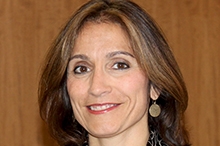
Susana Cordova is being honored as a Latino Educator Champion of Change.
At Denver Public Schools, our vision is for every child to succeed. My work as our Chief Schools Officer is to ensure we’re moving closer to achieving that vision every day in our schools. For me, education is deeply personal work. I am a graduate of Denver Public Schools. I began my career here as a teacher. Over the years, I have worked in multiple capacities in our public schools to support student learning and growth.
I come to work every day because I care deeply about each of our students, and I believe that every one of them has tremendous potential. I believe every student can succeed, and I am committed to providing every student with the supports and resources each needs to unlock his or her potential. Transforming that commitment into action – both for myself and for our thousands of educators – is where the challenge as a leader arises.
There are many issues that are outside of our control in education. My work as the leader for all of our public schools is to ensure we remain focused on the areas we can impact and that we pursue the high-impact strategies that lead to results for our kids.
I’m most proud of the work I’ve done to lead our students who are learning English as a second language.
There are more than 120 languages spoken in Denver Public Schools, with the majority of students primarily speaking Spanish in their homes. It’s important for our students who speak a language other than English to have a clear path toward English language acquisition once they enter our schools. We provide English language educating while also recognizing that a student’s native language is an important bridge to their culture and heritage. We don’t want students to lose that connection.
We have a variety of structures in place to help our students learning English. Every summer, we hold an intensive English Language Acquisition academy for students in elementary and middle school to help them build their language skills. During the school year, we have teachers who are trained in teaching English as a second language working with our students in nearly every school. And we’re constantly working with schools to monitor our progress and make adjustments throughout the course of the year.
This targeted approach has led to strong gains: Since 2010, we’ve increased a 15 percentage point increase in the state assessment for English proficiency among our students learning English as a second language.
Our approach allows us to have a significant impact on our students learning English as a second language. While there is still much work to do in this area, we are on our way to reaching that vision of success for every child. My role is to keep us focused and on-track to achieving our goal, and I look forward to working with our educators to get us there.
Susana Cordova is Chief Schools Officer of Denver Public Schools.
Building Pathways to and Through College
Posted by on September 26, 2014 at 10:59 AM EST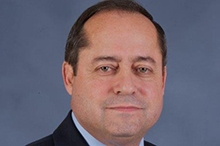
Dr. Daniel King is being honored as a Latino Educator Champion of Change.
I am thrilled to be named a Champion of Change. This is a tribute to the hard work of the entire Pharr-San Juan-Alamo ISD (PSJA) education community, which serves over 32,000 students, 99% of whom are Hispanic and 89% of whom are economically disadvantaged.
I was named Superintendent of PSJA in 2007, after a rewarding tenure at Hidalgo ISD. At the time, PSJA was making headlines for all the wrong reasons. A national report had labeled all three comprehensive high schools "dropout factories.” The district’s dropout rate was more than double the state average, and the four-year high school graduation rate was only 62.4%. Fortunately, PSJA had many committed educators, and the community was eager for change.
We committed to re-engaging disconnected youth in an ongoing initiative we call "Countdown to Zero.” Partnering with South Texas College, we opened a dual enrollment high school for dropouts between the ages of 18 and 26 and developed other customized programs for youth facing various types of challenges. Hundreds of former dropouts have now earned their diplomas. Today, PSJA's cohort dropout rate is a small fraction of what it was and is less than half the state average. The four-year high school graduation rate surpasses state and national averages, hitting 90.1% for the class of 2013. The number of students graduating from high school has doubled, as has the number of students entering college.
Our focus is on increasing the percentage of students who complete high school and transition successfully "to and through" college. In 2008, we began to create and scale Early College High School designs throughout the district. Currently, more than 3,000 of our high school students are enrolled in college courses. Most of the class of 2014 has already started earning college credit, even before completing high school.
We are determined to change the destiny of our community and provide solutions that can dramatically improve educational attainment and economic well-being for Americans of all backgrounds. Now, school districts and colleges from Texas and beyond are trying to draw lessons from the systemic changes that have taken place in PSJA. I hope that we can continue to play a leadership role in educating the next generation of students and preparing them for success.
Dr. Daniel King is the Superintendent of the Pharr-San Juan-Alamo Independent School District, which serves more than 32,000 students in the lower Rio Grande Valley of Texas.
Learn more about EducationA Culture of High Expectations and Opportunities
Posted by on September 26, 2014 at 10:54 AM EST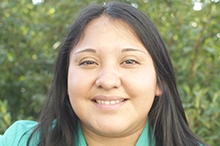
Amelia Castañeda is being honored as a Latino Educator Champion of Change.
The oldest of four, I was a first-generation college graduate from Virginia Tech. In the fall of 2013, my youngest brother Saul was about to embark on his first semester of college after graduating a year early from high school. He shared with me that I had inspired him to pursue a college education. I was touched, especially since I had helped him along the way with his applications.
Flash forward a year later. Hanging out in Saul’s room back home with my brother Greg, I had the chance to revisit our conversation and I asked specifically, “How did I inspire you?” Greg chimed in and said simply, “You raised the standard.”
Ever since joining the Higher Achievement team three and a half years ago, I have been able to articulate more clearly what has propelled me to give back to my community. I believe strongly in the three principles that guide Higher Achievement: talent is everywhere, intellect is built through effort, and opportunities matter.
Growing up, nobody expected me to attend college right after high school. Not because my parents didn’t believe in me or because there was a lack of caring, but simply because they didn’t know how I could make that leap. Some of my peers were expected to go to college, but what becomes an expectation for some can be a foreign language to many. During my senior year in high school, I found myself continually feeling left behind. While everyone was speaking this magical language that included college applications and SAT’s, I felt completely lost.
At Higher Achievement, my mission is to bridge that communication gap for families and students and to introduce the expectation of college attendance in the middle school years. We infuse our scholars with opportunities to not only discover their interests but also to prepare them for the rigor of high school and beyond. For example, we take our 7th and 8th graders on an overnight college visit, which for most of them is their first experience setting foot on a college campus.
I first joined Higher Achievement in the spring of 2011 as we launched our Richmond affiliate. Prior to joining Higher Achievement, I worked at a school with students with autism in a one-on-one setting. There, I was already touching on two major Higher Achievement principles—setting high standards and expectations, as well as providing opportunities for our students to excel.
Last year, Higher Achievement introduced a new, bold vision: That, by 2030, all students in Higher Achievement cities (Richmond, Alexandria, Baltimore, Pittsburgh, and Washington, D.C.) will graduate high school prepared for college. As an organization, we have challenged ourselves to make college an expectation across the board. Accomplishing this goal will require a coordinated effort from staff, school districts, and community partners. As our communities band together to realize our bold goal of universal college-readiness by 2030, I am proud of the work we are all doing to raise the standards and make high expectations the new norm for all. One by one, we all have the power to be champions in our own communities and create a domino effect that inspires others to succeed and dream big.
Amelia Castañeda is the Alexandria Center Director for Higher Achievement, an organization dedicated to closing the opportunity gap for middle school youth.
Learn more about EducationWe Have the Power to Change the World…Now Let’s Get to Work!
Posted by on September 26, 2014 at 10:35 AM EST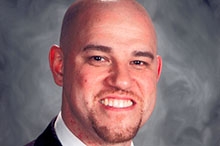
Anibal Soler is being honored as a Latino Educator Champion of Change.
I am honored and humbled to be recognized as a White House Champion of Change. This is an honor that I will never forget receiving, but an honor that I cannot accept alone. I am one individual amongst many caring educators at my school and in my community working hard to make a difference in the lives of our children. I’ve been taught that the ultimate thing that matters in our lives is what we have done for others rather than the material items we own—and that has continued to drive me during my career in education.
My educational journey began in 2000, as an art teacher in a high-needs urban middle school in Rochester, New York. Since then, I knew internally that I could take on a larger role in bettering my community. I was fortunate enough to have others see potential in me; just a few years later, I found myself in the role of school principal.
I stepped into East High School in 2009, and I was the fourth school principal in three years. The school was hurting, lost and looking for stable leadership. The school community wanted a leader that was committed to supporting teachers in their drive to improve student outcomes. I was fortunate to have been given that opportunity, and since that day I haven’t looked back. I look forward to future opportunities to develop a comprehensive “best-practice” urban high school with the best teachers, administrators, curriculum, facilities, and school supports available.
During our school’s morning announcements, we always announce, “We have the power to change the world…Now let’s get to work!” I hope that we can all take that message to heart.
Anibal Soler, Jr. is the Principal of East High School in Rochester, New York.
Helping Young People Help Themselves
Posted by on September 26, 2014 at 10:32 AM EST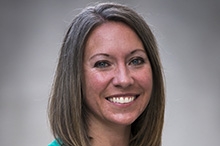
Shana Runck is being honored as a Latino Educator Champion of Change.
Over the course of my career, I would have never expected that my hard work and dedication to giving back to the community would lead me to being named a White House Champion of Change. As a New Mexico native and long-time educator, I have always had a passion to help at-risk Latino youth and to provide them with skills necessary for a successful transition into college and future employment. I am honored that I’ve been given an opportunity to make a difference in my local community, and I am grateful to receive this national recognition on behalf of New Mexico Educators Federal Credit Union for the programs we have worked so hard to develop.
One of the main programs I’m involved with, Running Start for Careers, allows high school sophomores, juniors, and seniors to earn dual-credit hours toward graduation while gaining valuable work skills and on-the-job training. The course focuses on careers in the financial services industry from tellers and loan officers to marketing and human resources. Students who complete the course have the opportunity to interview for an internship at the Credit Union, where they can earn high school and college credit, an hourly paid wage, and a valuable work experience in a career they are passionate about.
I also helped create the financial capabilities program at New Mexico Educators Federal Credit Union. Educational institutions, business, and non-profits utilize the program to provide participants with the knowledge and skills required to effectively manage their finances. The financial capabilities program is scalable to provide an 18-module curriculum, individual financial workshops, and topic-specific training, and it is the only model aligned with New Mexico’s Common Core State Standards. I work closely with each of our partner institutions to adapt the curriculum to reflect their particular goals, ensuring that we provide an effective resource for our partners.
It is a rewarding to know that my work within the local community has inspired students to pursue education and job training in fields that interest them and to learn foundational financial skills. In a state with high poverty rates, low youth employment, and high student dropout rates, I am grateful that New Mexico Educators Federal Credit Union has given me a platform to make a difference in increasing high school graduation rates among Latino youth and providing them with employment opportunities. It is an honor to be named a White House Champion of Change among other inspiring individuals from all across this great nation.
Shana Runck is the Assistant Vice President of Community Relations and Financial Capabilities with New Mexico Educators Federal Credit Union in Albuquerque, New Mexico.
Promise Zones: Creating Opportunities
Posted by on September 24, 2014 at 8:32 AM ESTEd. note: This is cross-posted on the U.S. Department of Housing and Urban Development's blog. See the original post here.
As the former Mayor of an urban Promise Zone community, I have a unique appreciation for the passion and dedication local leaders have when working to turn around their communities.
I saw San Antonio’s Promise Zone create new pathways allowing our citizens the chance to reach higher, dream bigger, and reach goals they never thought imaginable. They are about giving folks who have been under served for far too long the opportunity to build stronger neighborhoods and more prosperous lives. I am honored to share this opportunity with other communities across the country as they work to transform their futures.
- &lsaquo previous
- …
- 20
- 21
- 22
- 23
- 24
- 25
- 26
- 27
- 28
- …
- next &rsaquo


Twitter